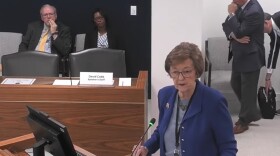After weeks of almost no budget talks, state lawmakers finally agreed to break their deadlock. At a public conference committee meeting on Wednesday, they openly negotiated their adjustments to the two-year budget plan and seemingly resolved differences over Medicaid funding.
When lawmakers meet to negotiate the state’s budget plan, they usually do it behind closed doors. That’s why it was surprising when Senate leaders decided to open up the conference committee to the public. Hours before the meeting, some skeptics brushed it off as political theater. It wasn’t clear that House leaders would even show up.
But they did show up, and they were ready to get down to business. Republican Representative Nelson Dollar said that House members decided to reconsider the Senate’s budget offer.
“And also to do what we believe is our part to break the logjam and to move forward and get our subcommittees negotiating because we all want to get out of here,” Nelson said.
Lawmakers didn’t meet their July first deadline to make adjustments to the state’s two-year spending plan. The House and Senate have been at odds over key priorities – including how much to set aside for Medicaid spending.
“We have been listening carefully to all of our previous conversations and the clear message that we have received, Senator Brown, from you and your excellent group, is meet us in the middle. Let’s meet in the middle,” said Nelson.
Senate leaders have blasted the House’s plan because they say it doesn’t set aside enough money for Medicaid, the health insurance program for low-income and disabled people. Senator Harry Brown told house members that a final plan should account for worst-case scenarios because Medicaid forecasts are never 100-percent accurate.
“Our thoughts on Medicaid is look at the history, see where we’ve been in the last 3-4 years as it relates to Medicaid,” said Brown. “Each and every year, when we thought we had fully funded it and thought we wouldn’t have problems, we’ve had to come back each and every year and backfill Medicaid.”
Brown said the state has spent about $2 billion in the past four budget cycles to back-fill Medicaid shortfalls.
After Brown’s comments, Representative Dollar argued that those shortfalls weren’t because of uncontrollable program costs, but because of off-budget debts and bad calculations. Still, he went ahead and offered a plan to meet in the middle. He said the House would be willing to set aside about $136 million dollars for cost overruns in the previous year, and about $186 million for costs in the next fiscal year.
As it became clearer that this was a real negotiation and not political theater, the mood in the room shifted.
“This kind of reminds of selling a car a little bit, this is pretty good,” said Brown.
“You haven’t sold the car yet, but we do like some of the features,” Dollar jokingly replied.
Coming to an agreement on Medicaid is a turning point for the Senate and House, but there’s still a lot left on the table - including teacher pay and how much money can be counted on from lottery. The Senate plan offers bigger raises for teachers than the House plan. But it would cut more than 7,000 classroom assistants to help pay for them.
Senate leader Phil Berger was coy when asked how talks about those education issues would pan out.
“All of those things are up to negotiations, I’m not prepared to talk about what our position might be or what our position might not be,” said Berger.
Berger also wouldn’t comment on their timeline, only to say that they’ll continue negotiations sooner, rather than later.










